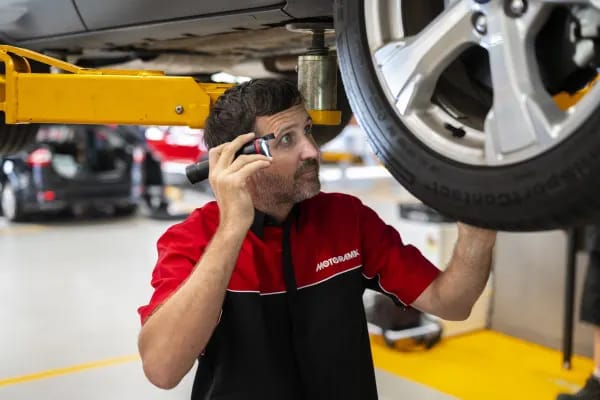
Fixing squeaky brakes
Posted in Servicing Insights
Fixing squeaky brakes
You’re slowing down at the lights, but instead of coming to a stop quietly – your brakes squeal and scream their way to a halt.
So what’s the matter and how do you fix it?
First, a basic explanation of how most modern brakes work: you put your foot down on the pedal, which tells the brake caliper to make two pads squeeze the rotor which the wheel is attached to, to slow the car’s forward momentum or kinetic energy (which is also why you can coast, instead of the car just stopping when you’re not pressing the accelerator.)
By their nature, brakes work by creating friction with a big metal disc – which will produce some noise (like a soft, whirring sound as the rotor vibrates against the brake pads.)

Squeaking brakes isn’t uncommon
Squeaking isn’t an uncommon sound for brakes to make – every car can have squeal to a stop if you set off on a particularly damp morning and the brake pads have to press against the tiny layer of rust that might have formed overnight. This often goes away once you’ve started (and stopped) a few times, and is no big deal.
If you consistently have squeaky brakes, it might be to do with the brake pads themselves. While most manufacturers fashion their products from organic (rubber, resin) or ceramics, some cheaper products on the market are made increased metal content which leads to squealing and metallic brake dust (which can cause rust/corrosion problems down the line if you allow it to build up.)
What to look for
Your brake pads are usually good for tens of thousands of kilometres, but it really depends on how you drive – drivers who have to nudge the brake in city traffic will potentially see their brakes wear out faster than someone who uses their car to head out to travel on the weekend.
The rotors of the wheels can also start to wear – most are built to last for decades – but if you have an older car, maybe you do a lot of off-roading (particularly on the beach) or damaged your car in an accident that wasn’t properly repaired, rust can start to set in to parts of any car. Usually corrosion can be dealt with (often with a good wire brush!) but if it has set into the wheel itself, it can become dangerous, as the smooth surface of the brake disc is now uneven with rust.



